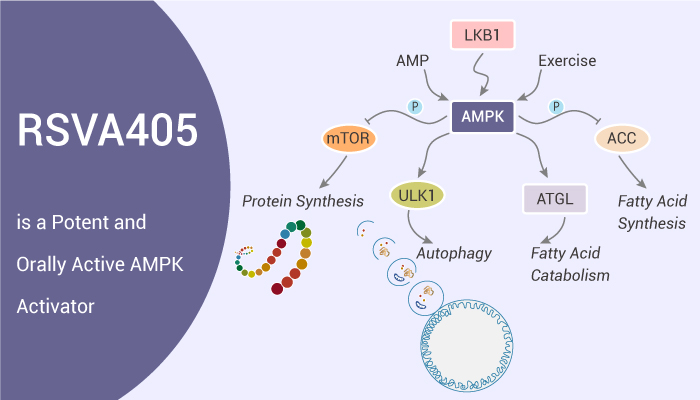AMP-activated protein kinase (AMPK) is a central regulator of cellular and whole-body energy homeostasis. AMPK regulates cellular energy levels by balancing nutrient availability and energy demand via its control of several proteins involved in glucose and lipid metabolism, including the regulator of fatty acid biosynthesis acetyl-CoA carboxylase (ACC). RSVA405 can significantly activate AMPK and inhibit ACC. ACC is one target of AMPK and a key regulator of fatty acid biogenesis in nondifferentiated and proliferating 3T3-L1 adipocytes.

AMPK is a sensor and regulator of cellular energy metabolism. RSVA405 is a potent indirect activator of AMPK (EC50=1 μM, in cell-based assays). AMPK potentially implicates in a broad range of conditions, including obesity and Alzheimer’s disease. RSVA405 treatments inhibits 3T3-L1 adipocyte differentiation by interfering with mitotic clonal expansion during preadipocyte proliferation (IC50=0.5 μM).
RSVA405 prevents the adipogenesis-dependent transcriptional changes of multiple gene products involved in the adipogenic process, including PPAR-γ, CCAAT/enhancer-binding protein α (C/EBPα), fatty acid synthase, fatty acid binding protein 4 (aP2), RANTES or resistin. Furthermore, orally administered RSVA405 at 20 and 100 mg/kg/d significantly reduces the body weight gain of mice fed a high-fat diet. RSVA405 activates AMPK 50 times more potently than Resveratrol. In addition, RSVA405 has an anti-inflammatory effect through the inhibition of STAT3 function. RSVA405 inhibits both constitutive and stimulated STAT3 in HEK293 cells and lipopolysaccharide (LPS)-activated RAW 264.7 macrophages, respectively.
All in all, the small-molecule activator of AMPK RSVA405 is a potent inhibitor of adipogenesis and thus may have therapeutic potential against obesity. AMPK is a promising target for the treatment of metabolic disorders, such as type 2 diabetes and obesity.